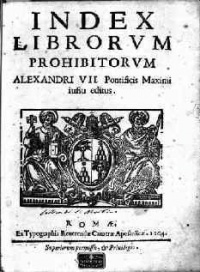Christian censorship
From The Art and Popular Culture Encyclopedia

Illustration: Index Librorum Prohibitorum ("List of Prohibited Books") of the Catholic Church.
|
Related e |
|
Featured: |
The invention of the printing press by Johannes Gutenberg around 1440 changed the nature of book publishing. As of the 16th century, in most European countries both the church and governments attempted to regulate and control printing. Governments established controls over printers across Europe, requiring them to have official licenses to trade and produce books.
In 1557 the English Crown aimed to stem the flow of dissent by chartering the Stationers' Company. The right to print was restricted to the two universities (Oxford and Cambridge) and the 21 existing printers in the City of London. In France, the 1551 Edict of Châteaubriant included provisions for unpacking and inspecting all books brought into France. The 1557 Edict of Compiègne applied the death penalty to heretics and resulted in the burning of a noblewoman at the stake.
A first version of the Index Librorum Prohibitorum ("List of Prohibited Books") was promulgated by Pope Paul IV in 1559, and multiple revisions were made to it over the years.
Some works named in the Index Librorum Prohibitorum are the writings of Desiderius Erasmus, a Catholic scholar who argued that the Comma Johanneum was probably forged and De revolutionibus orbium coelestium, a treatise by Nicolaus Copernicus arguing for a Heliocentric orbit of the earth, both works that at the time contradicted the Church's official stance on particular issues.
The final (20th) edition appeared in 1948, and it was formally abolished on 14 June 1966 by Pope Paul VI. However, the moral obligation of the Index was not abolished, according to the Congregation for the Doctrine of the Faith. Furthermore, the 1983 Code of Canon Law states that bishops have the duty and right to review material concerning faith or morals before it may be published.
Some examples of Christian bans:
- The Da Vinci Code was banned in Samoa.
See also
- Censor Librorum, religious censorship, Censorship of the Church of Rome and Its Influence Upon the Production and Distribution of Literature, Legion of Decency

